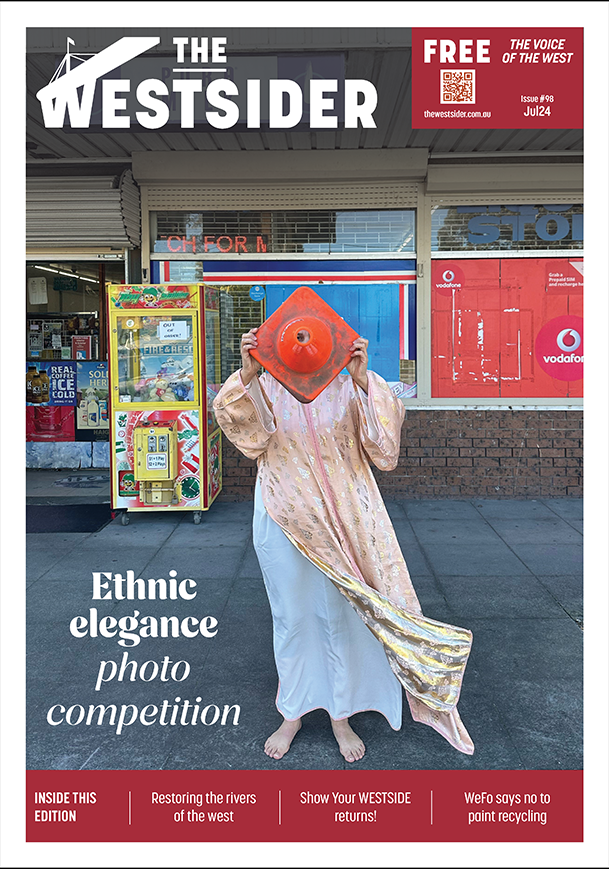By Elyse Cunningham
At the time of this interview, Nasreen Mohamed was living in the Mambourin Estate in Werribee. A new housing development in the City of Wyndham, built by Frasers Property Developers.
On their website it says they are ‘working with the brightest minds to imagine a community of city-like convenience, moments from all the amenities you could need.’
As it currently stands, this couldn’t be any further from the truth…
Nasreen and I met at a protest held in Mambourin, calling on the government to provide a bus service for the area. Currently, the nearest bus stop is a 30 minute walk away, so residents are forced to depend on cars to get around. Children who live in Mambourin Estate rely on their parents to drive them around as it is unsafe to walk to and from the bus stop, especially on cold, dark, winter days.
On March 14th 2024, Nasreen along with many other members of the western community, joined us to share stories and experiences of living with the broken bus network. A panel of local and state government representatives joined to listen to the community and tell us why they think the west has been left behind for so long, and what they are going to do about it.
The conversation was lively and heated, with many participants expressing their frustration at the lack of action on public transport, despite the growing demand from the community, who are fed up with being ignored by decision makers. Nasreen shared her story of migrating over from India with her family, the difficulties they have had in accessing work, education and community, and the impact that this has had on her mental and physical wellbeing.
A few days later, Nasreen and I met to reflect on how she felt the forum went.
Nasreen: The politicians were the same like India. They are just playing the blame game… I did not expect this answer from the politicians in a Western country. It was a bit demotivating and frustrating.
Having campaigned on this issue for several years now. I understand where Nasreen is coming from. There seems to be a lack of accountability, and the community is suffering because of this. Nasreen mentioned multiple times how the lack of access to a bus affects her motivation for work and education, as it is so much harder to get around without it.
Nasreen: When I had public transport and buses near my house, I was able to catch the early morning bus to reach the station. It was good and it motivated me every day to go to the college and do the study and I completed all subjects and all assignments on time, and I completed my course.
But now the place where we have been living more than nearly 3 years now, it’s demotivating and debilitating. Not having the bus nearby, I have to spend a lot of money on cabs morning and evening to go to uni.
It’s been six to seven months now. I’m not that productive in work because it is affecting me a lot because whatever money I’m earning per month, I have to pay to the cab and it is costing $160 per week.
Transport disadvantage has a particular effect on women, especially if they don’t drive. Not only is it costly to have to pay for Ubers to get around, but it creates structural barriers by limiting women’s access to work and community.
Nasreen: I’m a driven woman. I know what I’m doing. I know what I’m choosing. My life is in my hands. Nothing can control me. But, the lack of bus access in this place is controlling everything… See, if I have a bus, I will take the bus to work, uni, to the hospital, to the community centre, and so that I can meet my friends…
In Australia I have seen lots of the women speaking on the radios, and they have been very aggressive and ferocious. On the news I’ve seen women interviews and I felt empowered and I feel ‘Okay, this is the country I need. This is the place where I need to go for my better future.’
Life for Nasreen and others in her community is not at all what they expected moving there.
People are sold a vision of opportunities, connection, community; but in estates like Mambourin, it is difficult to access even basic necessities.
Nasreen: Before moving here, we heard Australia is a multicultural, diverse country.
We used to have a lot of cultural barriers over the years, and we assumed that we are not going to have any barriers here to grow as a person.
Unfortunately, we do have the barriers here as well. Not having all the basic things which we need in the community, it is creating a lot of limitations and it’s hindering our success, and it’s cutting off my wings.
Since this interview, Nasreen has returned to India, unsure whether or not she will return. At home there is a bus that comes regularly and only costs 10 rupees, which is roughly 20 cents.
The fact that people are leaving what has been dubbed as one of the ‘most liveable cities in the world’ speaks volumes to the disparity between different areas of our city. The western suburbs community has been taken for granted for far too long, and something needs to change.
It’s time for the government to stop leaving the west behind.
Elyse Cunningham is the coordinator for the Better Buses for the West campaign at Friends of the Earth Melbourne

